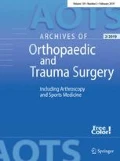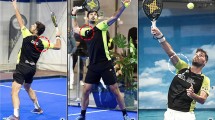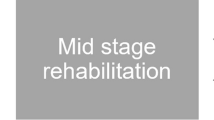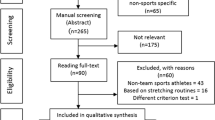Abstract
Purpose
There is a lack of consensus regarding appropriate criteria attesting patient’s unrestricted sports activities after ACL reconstruction. The purpose of this study was to perform a survey among experienced arthroscopic surgeons regarding their return to play guidelines in these patients.
Methods
A six-item questionnaire was distributed among experienced arthroscopic surgeons (instructors of the German speaking society of arthroscopy, AGA). Study participants were asked to choose from multiple choice answers and had the possibility answering in an open discussion field.
Results
The response rate of the survey was 85.7 %. A total of 83.5 % used autologous hamstring grafts for ACL reconstruction in athletes followed by BPTB (37.2 %) and quadriceps tendon graft (12 %). Approximately 63.5 % recommended a time point later than 6 months allowing return to play after ACL reconstruction in the athlete (after 4 and 6 months 2.3 and 35.3 %, respectively). 76.6 % recommended starting with sports specific rehabilitation after 4 months (21.6 % after 6 months). The most frequent criterion (multiple answers) to allow return to play was negative Lachman test (81.7 % positive answers) followed by free range of motion (78.4 %), negative pivot shift (60.1 %), anterior drawer (45.4 %), proprioception test (43.1 %), muscular strength analysis (40.8 %), single-leg hop jump test (39.0 %), KT 1000 measurement (16.1 %), and MRI (4.1 %). Of the surgeons 85.8 % did not use any of the given scores as criterion to allow return to competitive sports (subjective IKDC score 10.6 %, Lysholm score 8.3 %, objective IKDC score 7.4 %, Tegner activity scale 3.7 %).
Conclusion
In conclusion, the majority of surgeons do not consider muscle function, jump tests, alignment tests, and proprioception as relevant return to sports criterion. However, these are two crucial parameters for return to sports.








Similar content being viewed by others
References
Ait Si Selmi T, Fithian D, Neyret P (2006) The evolution of osteoarthritis in 103 patients with ACL reconstruction at 17 years follow-up. Knee 13:353–358
Ardern CL, Webster KE, Taylor NF, Feller JA (2011) Return to sport following anterior cruciate ligament reconstruction surgery: a systematic review and meta-analysis of the state of play. Br J Sports Med 45(7):596–606
Barber-Westin SD, Noyes FR (2011) Factors used to determine return to unrestricted sports activities after anterior cruciate ligament reconstruction. Arthroscopy 27(12):1697–1705
Barber-Westin SD, Smith ST, Campbell T, Noyes FR (2010) The drop-jump video screening test: retention of improvement in neuromuscular control in female volleyball players. J Strength Cond Res 24(11):3055–3062
Bonfim TR, Paccola CA, Barela JA (2003) Proprioceptive and behavior impairments in individuals with anterior cruciate ligament reconstructed knees. Arch Phys Med Rehabil 84:1217–1223
Crossley KM, Zhang WJ, Schache AG, Bryant A, Cowan SM (2011) Performance on the single-leg squat task indicates hip abductor muscle function. Am J Sports Med 39:866–873
Deneweth JM, Bey MJ, McLean SG, Lock TR, Kolowich PA, Tashman S (2010) Tibiofemoral joint kinematics of the anterior cruciate ligament-reconstructed knee during a single-legged hop landing. Am J Sports Med 38:1820–1828
Drogset JO, Grøntvedt T, Robak OR, Mølster A, Viset AT, Engebretsen L (2006) A sixteen-year follow-up of three operative techniques for the treatment of acute ruptures of the anterior cruciate ligament. J Bone Joint Surg Am 88:944–952
Eitzen I, Holm I, Risberg MA (2009) Preoperative quadriceps strength is a significant predictor of knee function two years after anterior cruciate ligament reconstruction. Br J Sports Med 43:371–376
Gao B, Zheng NN (2010) Alterations in three-dimensional joint kinematics of anterior cruciate ligament-deficient and reconstructed knees during walking. Clin Biomech (Bristol, Avon) 25:222–229
Gokeler A, Hof AL, Arnold MP, Dijkstra PU, Postema K, Otten E (2010) Abnormal landing strategies after ACL reconstruction. Scand J Med Sci Sports 20:e12–e19
Hartigan EH, Axe MJ, Snyder-Mackler L (2010) Time line for noncopers to pass return-to-sports criteria after anterior cruciate ligament reconstruction. J Orthop Sports Phys Ther 40:141–154
Hertel P, Behrend H, Cierpinski T, Musahl V, Widjaja G (2005) ACL reconstruction using bone-patellar tendon-bone press-fit fixation: 10-year clinical results. Knee Surg Sports Traumatol Arthrosc 13:248–255
Hewett TE, Myer GD, Ford KR (2006) Preparticipation physical examination using a box drop vertical jump test in young athletes: the effects of puberty and sex. Clin J Sport Med 16:298–304
Hiemstra LA, Webber S, MacDonald PB, Kriellaars DJ (2007) Contralateral limb strength deficits after anterior cruciate ligament reconstruction using a hamstring tendon graft. Clin Biomech (Bristol, Avon) 22:543–550
Hui C, Salmon LJ, Kok A, Maeno S, Linklater J, Pinczewski LA (2011) Fifteen-year outcome of endoscopic anterior cruciate ligament reconstruction with patellar tendon autograft for “isolated” anterior cruciate ligament tear. Am J Sports Med 39:89–98
Keays SL, Bullock-Saxton JE, Keays AC, Newcombe PA, Bullock MI (2007) A 6-year follow-up of the effect of graft site on strength, stability, range of motion, function, and joint degeneration after anterior cruciate ligament reconstruction: patellar tendon versus semitendinosus and gracilis tendon graft. Am J Sports Med 35:729–739
Kvist J (2004) Rehabilitation following anterior cruciate ligament injury: current recommendations for sports participation. Sports Med 34:269–280
Madhavan S, Shields RK (2011) Neuromuscular responses in individuals with anterior cruciate ligament repair. Clin Neurophysiol 122:997–1004
Mascarenhas R, Tranovich M, Karpie JC, Irrgang JJ, Fu FH, Harner CD (2010) Patellar tendon anterior cruciate ligament reconstruction in the high-demand patient: evaluation of autograft versus allograft reconstruction. Arthroscopy 26:S58–S66
Myklebust G, Holm I, Maehlum S, Engebretsen L, Bahr R (2003) Clinical, functional, and radiologic outcome in team handball players 6 to 11 years after anterior cruciate ligament injury: a follow-up study. Am J Sports Med 31:981–989
Nakata K, Shino K, Horibe S (2008) Arthroscopic anterior cruciate ligament reconstruction using fresh-frozen bone plug free allogeneic tendons: 10-year follow-up. Arthroscopy 24:285–291
Neeter C, Gustavsson A, Thomeé P, Augustsson J, Thomeé R, Karlsson J (2006) Development of a strength test battery for evaluating leg muscle power after anterior cruciate ligament injury and reconstruction. Knee Surg Sports Traumatol Arthrosc 14:571–580
Noyes FR, Barber-Westin SD, Fleckenstein C, Walsh C, West J (2005) The drop-jump screening test: difference in lower limb control by gender and effect of neuromuscular training in female athletes. Am J Sports Med 33(2):197–207
Noyes FR, Barber SD, Mangine RE (1991) Abnormal lower limb symmetry determined by function hop tests after anterior cruciate ligament rupture. Am J Sports Med 19:513–518
Noyes FR, Barber-Westin SD, Fleckenstein C, Walsh C, West J (2005) The drop-jump screening test: difference in lower limb control by gender and effect of neuromuscular training in female athletes. Am J Sports Med 33:197–207
Orishimo KF, Kremenic IJ, Mullaney MJ, McHugh MP, Nicholas SJ (2010) Adaptations in single-leg hop biomechanics following anterior cruciate ligament reconstruction. Knee Surg Sports Traumatol Arthrosc 18:1587–1593
Papannagari R, Gill TJ, Defrate LE, Moses JM, Petruska AJ, Li G (2006) In vivo kinematics of the knee after anterior cruciate ligament reconstruction: a clinical and functional evaluation. Am J Sports Med 34:2006–2012
Paterno MV, Schmitt LC, Ford KR (2010) Biomechanical measures during landing and postural stability predict second anterior cruciate ligament injury after anterior cruciate ligament reconstruction and return to sport. Am J Sports Med 38:1968–1978
Petersen W, Zantop T, Rosenbaum D, Raschke MJ (2005) Rupture of the anterior cruciate ligament in female athletes. Part 2: prevention strategies. Deutsche Zeitschrift für Sportmedizin 6:157–165
Pinczewski LA, Lyman J, Salmon LJ, Russell VJ, Roe J, Linklater J (2007) A 10-year comparison of anterior cruciate ligament reconstructions with hamstring tendon and patellar tendon autograft: a controlled, prospective trial. Am J Sports Med 35:564–574
Salmon LJ, Russell VJ, Refshauge K (2006) Long-term outcome of endoscopic anterior cruciate ligament reconstruction with patellar tendon autograft: minimum 13-year review. Am J Sports Med 34:721–732
Shelbourne KD, Gray T, Haro M (2009) Incidence of subsequent injury to either knee within 5 years after anterior cruciate ligament reconstruction with patellar tendon autograft. Am J Sports Med 37:246–251
Tashman S, Kolowich P, Collon D, Anderson K, Anderst W (2007) Dynamic function of the ACL-reconstructed knee during running. Clin Orthop Relat Res 454:66–73
van Grinsven S, van Cingel RE, Holla CJ, van Loon CJ (2010) Evidence-based rehabilitation following anterior cruciate ligament reconstruction. Knee Surg Sports Traumatol Arthrosc 18:1128–1144
Weiler A, Peine R, Pashmineh-Azar A, Abel C, Südkamp NP, Hoffmann RF (2002) Tendon healing in a bone tunnel. Part I: biomechanical results after biodegradable interference fit fixation in a model of anterior cruciate ligament reconstruction in sheep. Arthroscopy 18(2):113–123
Author information
Authors and Affiliations
Corresponding author
Rights and permissions
About this article
Cite this article
Petersen, W., Zantop, T. Return to play following ACL reconstruction: survey among experienced arthroscopic surgeons (AGA instructors). Arch Orthop Trauma Surg 133, 969–977 (2013). https://doi.org/10.1007/s00402-013-1746-1
Received:
Published:
Issue Date:
DOI: https://doi.org/10.1007/s00402-013-1746-1




